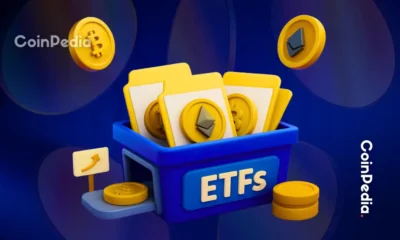Ethereum
Ethereum Co-Founder Vitalik Buterin Redefines ZK and FHE Performance with ‘Efficiency Ratio’ Metric

Credit : coinpedia.org
Co-founder of Ethereum Vitalik Buterine calls on builders within the fields of zero-knowledge proofs (ZK) and totally homomorphic encryption (FHE) to rethink how they measure efficiency. Proper now, many builders give attention to “operations per second,” however Vitalik says that does not give the total image. He suggests utilizing an effectivity ratio as an alternative. This exhibits how a lot slower a calculation turns into when coded, in comparison with operating it usually.
Make efficiency clear
Vitalik defined on X that the effectivity ratio is simple to know and helps builders see the actual trade-offs. “You already understand how lengthy a tough calculation takes, so that you simply must multiply it to get the coded time,” he mentioned. This makes it {hardware} unbiased and extra sensible.
He additionally famous that the ratio just isn’t good; issues like reminiscence entry, parallel processing, and SIMD operations can have an effect on the outcomes. Nonetheless, he believes it is a a lot better measure than simply saying “we will carry out N operations per second,” which does not let you know how environment friendly the encryption actually is.
Specialists be part of the dialog
Crypto analyst Wei Dai agreed with Vitalik and referred to as this measurement kappa. Kappa exhibits how a lot further time is required to cryptographically show a calculation in comparison with performing it usually. Vitalik predicted that sooner or later, many computations may have a single-digit kappa, that means encryption would add little or no overhead. He mentioned some operations, equivalent to Poseidon hashing, are already very environment friendly, which is necessary for quantum-resistant cryptography.
Crypto person, Lucas Helminger joined the dialogue and requested the way to benchmark FHE overhead for blockchain use instances the place the community and variety of contributors may impression efficiency. Vitalik clarified that FHE is normally one-party, so the community issues little besides when sending enter or performing threshold decoding. Lukas mentioned that for blockchain purposes you will need to begin from a small variety of nodes as a result of massive networks can sluggish issues down. Vitalik added that threshold decoding needs to be measured utilizing bandwidth and community latency, whereas uncooked runtime is extra helpful for real-world estimation.
Ethereum’s scaling issues
Ethereum nonetheless faces effectivity challenges. Every node presently verifies every block, limiting how a lot information every block can maintain. Rising the gasoline restrict may enable extra transactions, but in addition dangers overloading validators, who’ve only some seconds to course of every block.
In the meantime, Ethereum developer Dankrad Feist, who helped design the Danksharding system, has joined Tempo, a brand new Layer-1 blockchain venture backed by Stripe and Paradigm. Feist is working to make networks sooner and extra environment friendly.
Why statistics are necessary
Vitalik’s push for clearer metrics is about serving to builders make higher choices. By utilizing effectivity ratios, or kappa, builders can see the true value of encryption, design sooner apps, and assist Ethereum scale in a balanced and dependable manner. These easy measures could make a giant distinction in the way forward for crypto growth.
By no means miss a beat within the Crypto world!
Keep knowledgeable with breaking information, knowledgeable evaluation, and real-time updates on the newest traits in Bitcoin, altcoins, DeFi, NFTs, and extra.
Incessantly requested questions
A zero-knowledge proof is a cryptographic technique that permits one social gathering to show to a different {that a} assertion is true, with out revealing any data past the validity of the assertion itself.
It’s a metric that compares how a lot slower a computation runs when encrypted than when it runs usually, offering a clearer image of cryptographic efficiency than uncooked velocity.
Clearer metrics like effectivity ratio assist builders optimize apps and layer 2 options, lowering the computational burden on the principle Ethereum community for sooner, cheaper transactions.
Belief CoinPedia:
CoinPedia has been offering correct and well timed cryptocurrency and blockchain updates since 2017. All content material is created by our knowledgeable panel of analysts and journalists, following strict editorial tips primarily based on EEAT (Expertise, Experience, Authoritativeness, Trustworthiness). Every article is fact-checked from respected sources to make sure accuracy, transparency and reliability. Our assessment coverage ensures unbiased evaluations when recommending exchanges, platforms or instruments. We attempt to supply well timed updates on all the pieces crypto and blockchain, from startups to trade majors.
Funding disclaimer:
All opinions and insights shared characterize the creator’s personal views on present market circumstances. Please do your individual analysis earlier than making any funding choices. Neither the author nor the publication accepts accountability on your monetary selections.
Sponsored and Adverts:
Sponsored content material and affiliate hyperlinks might seem on our web site. Adverts are clearly marked and our editorial content material stays fully unbiased from our promoting companions.
-

 Meme Coin7 months ago
Meme Coin7 months agoDOGE Sees Massive User Growth: Active Addresses Up 400%
-

 Blockchain1 year ago
Blockchain1 year agoOrbler Partners with Meta Lion to Accelerate Web3 Growth
-

 Videos1 year ago
Videos1 year agoShocking Truth About TRON! TRX Crypto Review & Price Predictions!
-

 NFT10 months ago
NFT10 months agoSEND Arcade launches NFT entry pass for Squad Game Season 2, inspired by Squid Game
-

 Meme Coin1 year ago
Meme Coin1 year agoCrypto Whale Buys the Dip: Accumulates PEPE and ETH
-

 Solana4 months ago
Solana4 months agoSolana Price to Target $200 Amid Bullish Momentum and Staking ETF News?
-

 Ethereum1 year ago
Ethereum1 year ago5 signs that the crypto bull run is coming this September
-

 Gaming1 year ago
Gaming1 year agoGameFi Trends in 2024


































